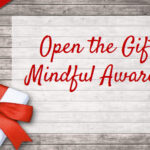
By Bhanu Joy Harrison, LCSW, SEP, UCLA Trained Mindfulness Facilitator
It’s already starting. Holiday decorations are showing up at the stores, music is playing at the mall, pumpkin lattes abound. The cultural and familial buildup to this season is magnified every year and, for many people, becomes totally overwhelming.
The experience of “too much” can replicate traumatic overwhelm in our nervous system, creating a whole season of nervous system dysregulation. This dysregulation then creates heightened emotions and reactivity (“What!? They didn’t make a vegan pumpkin pie??!”), depression and anxiety (“They don’t like my gift or I have to get the perfect gift”) and often a desire to literally escape the season’s events (fleeing by not going to the party) or a desire to dissociate (fleeing by leaving your body – I’ll just be on my phone for the whole dinner).
How can we assist our clients and ourselves in navigating this extended stressful season? Here are a few areas to consider:
Identify Holiday Childhood Trauma Histories and Beliefs
Many of my clients report a history of trauma around holiday events that is re-triggered every year. One survivor of early childhood abuse and neglect shared that her mother always requested a wish list for Santa. My client happily wrote down a few toys and books she really wanted from Santa. What did she open on Christmas Day? Socks and underwear. Not once in her childhood did she ever get a gift from her list! This deep ongoing disappointment left her with a belief of “don’t ask for what you want because you’ll never get it” and an extreme dislike of the holidays.
Another client shared that his mother always returned his holiday gifts, leaving him with a deep sense of “I never get it right” and “I’m just not good enough”. Needless to say, any gift giving creates a high level of anxiety and he often cannot take in any appreciation when he “gets it right”, thinking the recipient is lying to him.
For those with abuse histories, the holidays can re-trigger memories of physical, sexual or emotional abuse from relatives or family friends, making present day holiday events with their perpetrators simply unbearable.
Tools:
Dan Siegel’s (2012) “Name it to tame it”, can be invaluable for those with holiday trauma. When we can identify our traumatic history, we move the experience from the brainstem and limbic areas to include our prefrontal cortex “knowing” of what happened. While this may not prevent retriggering, it can keep us more in the ‘present moment’ where we can make a choice of how to take care of ourselves in the moment.
“Wow . . . I just noticed I’m worried about my family judging how I make the turkey dinner. I’m feeling tight in my chest. Maybe I’ll take a few deep breaths.”
Identify Our “Story”. In mindfulness practice, we gain skill in noticing when we are “in our story”, which is often based in the history of the past or the expectation of the future. Being aware of our storyline can, help us return to the present, which can mitigate somatic triggerings.
“As a child, I remember getting so excited during Hannukah! I had to tamp down my exuberance because my family said I was “too much”. I feel so uncomfortable and depressed during this time, feeling SO much energy inside me that has nowhere to go. What can I do differently this season?”
Be aware of our expectations. A wonderful holiday mindfulness exercise is being curious about our expectations. This can include identifying our wants and needs, noticing how our minds are “playing out” the holiday dinner, or gift opening scenarios. If we are hoping for the perfect Hallmark holiday, we will be disappointed.
Working with Expectations:
a. Sitting quietly, ask your body how it wants to feel during the holidays. Perhaps the answer comes as ”relaxed, content, calm, peaceful”.
b. Write down some wants and needs such as: “I want a calm holiday dinner with no yelling” or “I don’t want to have to interact with Uncle at ”
c. Now, write down some strategies for these wishes:
“I will make a request to my mom not to bring up child rearing issues at dinner because it always ends up with an argument.” “I will ask my partner to notice if Uncle is coming around near me and pull me aside so I don’t have to interact.”
d. Finally, create some self-care strategies, if your plan goes “I’ll excuse myself from the table if Mom starts an argument” or “I’ll tell Uncle__, I have to check on what’s happening in the kitchen.” And, if it all goes downhill, “No matter what happens, I’ll hold myself with care and kindness and be gentle with myself”.
Know Your Triggers and Your Resources
Knowing your triggers is extremely helpful in managing holiday overwhelm. Are you sensitive to lots of sounds, people, later nights, or sugar? If you are familiar with Stephen Porges’ (2011) Polyvagal Theory, notice what polyvagal state do you go into when you are triggered…High sympathetic overdrive with anxiety, anger, irritability or restlessness? Or do you drop into your dorsal vagal collapse state, with withdrawal, depression, disconnection, numbness or hopelessness?
Develop a Resource List
Help your clients manage their triggers by understanding their polyvagal system and create a resource list they can access easily. When we are triggered into high sympathetic or low dorsal states, we don’t have access to our linear frontal cortex brain functioning, so it can be diffi cult to remember what to do to help ourselves. Work with clients to develop a Resource List to help bring themselves back into a more regulated ventral vagal zone. Write these down, put them on your phone or post on your refrigerator. Some examples of resources:
| Pet an animal | Drink water | Take a walk |
| Exercise | Reach out to a friend | Dance |
| Sing | Journal | Meditate |
| Be creative | Prayer | Laugh |
Practice Boundary Setting
The holiday season is full of opportunities and challenges to set boundaries. Many people with trauma histories have diffi culty saying “no” to family and friends, and set themselves up to be overextended, dysregulated and stressed. Most of us know in advance what obligations we will have with school events, family, gift giving, etc. which gives us time to practice this skill.
Tools:
Help your clients by having them choose in advance what events they can handle. Say “yes” to their child’s Christmas concert, “no” to neighborhood association party. Encourage dialogue in advance with family members so everyone knows what each family member needs. Perhaps the rest of the family can attend the neighborhood party while you sit this one out.
Somatic Boundary Setting Practice:
If you are teaching this to a client, do this in session first, so you can support your client in noticing their reactions. It is a very powerful exercise! Have your clients begin saying “no” to smaller events to build some courage  around this practice.
around this practice.
In front of a mirror, practice saying “no” in all the different ways you can imagine. Shaking your head, saying “no” loudly, softly, firmly, tentatively. With each “no” you utter, take an actual minute of time to notice what happens in your body. Does it feel scary, or like something bad will happen? Does it feel energizing, overwhelming, empowering? What is your body posture like? Erect and strong, or collapsed? Try this sitting and standing up. Take a few breaths.
Now do this same exercise saying “yes” in all the ways you can imagine. Nodding, saying “uh uh”, uttering a loud, enthusiastic YES, a tentative yes, a begrudging yes. Again, take some breaths and see how these ‘yes-es’ feel in your body. Does it feel authentic, or people pleasing, obliging or joyful?
Remember . . . if you can’t say ‘no’ authentically, your ‘yes’ doesn’t mean very much.
Be present and S-L-O-W Down
The most powerful gift you can give to yourself and others is being present in the moment. No matter what happens, you can still connect with your niece, notice the pine fragrance, hear the rustle of wrapping paper, and notice your own breath. Take joy in the delight of children around you, donate if you can, enjoy the songs and traditions in the moment. Be ever so kind and gentle with yourself. Try slowing down to help your nervous system regulate . . . walk more slowly to your car in the parking lot, eat with slow attention to the flavors, take long deep breaths.
These mindfulness practices, being present to whatever is happening in the moment in your body, mind and emotions, with an attitude of kindness, curiosity and non-judgment, can be the greatest gift to yourself this season.
References:
Porges, S. (2011). The polyvagal theory: Neurophysiological foundations of emotions, attachment, communication and self regulation (1st edition). New York, NY: W.W. Norton & Company, Inc.
Siegel, D., & Bryson, T. (2012). The whole-brain child: 12 revolutionary strategies to nurture your child’s developing mind. New York, NY: Random House Publishing Group.
 Bhanu Joy Harrison, LCSW, SEP, is a UCLA- Trained Mindfulness Facilitator and Affiliate MAPs Teacher, UCLA Semel Institute, Mindful Awareness Research Center (MARC). She is also a Certified Mindfulness Teacher through the International Mindfulness Teachers Association (#P-0020) a certified Somatic Experiencing Practitioner and EMDR practitioner.
Bhanu Joy Harrison, LCSW, SEP, is a UCLA- Trained Mindfulness Facilitator and Affiliate MAPs Teacher, UCLA Semel Institute, Mindful Awareness Research Center (MARC). She is also a Certified Mindfulness Teacher through the International Mindfulness Teachers Association (#P-0020) a certified Somatic Experiencing Practitioner and EMDR practitioner.
Bhanu offers classes and workshops on mindfulness meditation, including UCLA’s well researched “Mindful Awareness Practices for Daily Living I” (MAPs I). In addition, she designs workshops and classes on mindful living, ethics and body awareness tools for bodyworkers, social workers and counselors. She is a licensed Clinical Social Worker in private practice in Albuquerque, New Mexico focusing on body centered and mindful approaches to trauma resolution and self-regulation.
She lived a contemplative life for eight years in the 1970’s at Kripalu Ashram, now the Kripalu Center for Holistic Health which, along with her family’s alternative interests, influenced the direction of her life towards awareness and mindful living. Over the years, she has continued to practice mindfulness and participated in many personal and professional growth retreats.
Bhanu is available for presentations and workshops and can be reached through her website at: www.choosingmindfulness.net







